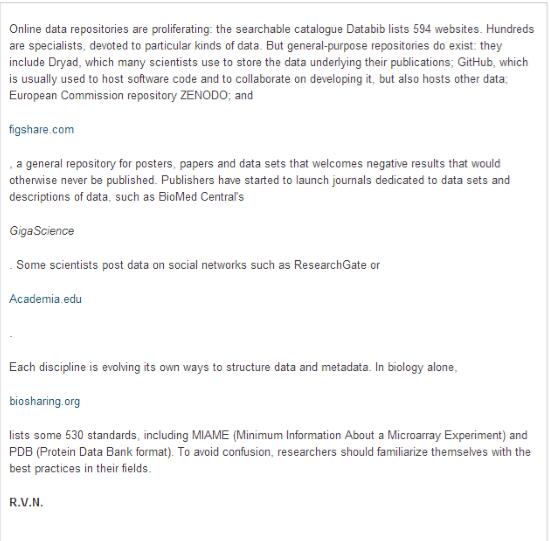六级课程经典
零基础速升HOT
去试听
六级1对1
定制化
12月六级 终极干货
押题
无痛版听力提升
0元
六级阅读 冲刺200+大招
0元
六级真题+答案
免费
听力提升 VOA&BBC原声
热门
1V1速成方案VIP
保研全流程免费
考研真题大全
免费
计算机考研
择校
27考研书单
推荐版
考研AI择校
智能体
But the barriers are disappearing, in part because journals and funding agencies worldwide are encouraging scientists to make their data public. Last year, the Royal Society in London said in its report Science as an Open Enterprise that scientists need to “shift away from a research culture where data is viewed as a private preserve”. Funding agencies note that data paid for with public money should be public information, and the scientific community is recognizing that data can now be shared digitally in ways that were not possible before. To match the growing demand, services are springing up to make it easier to publish research products online and enable other researchers to discover and cite them. There are so many, in fact, that choosing where and how to publish data sets and other supplementary material can be confusing (see'Abundant options').
Box 1: Abundant options

“Lots of people are getting into data-hosting, and I think it will be tricky to decide where to put your data,” says Heather Piwowar, who studies data-sharing for the US National Evolutionary Synthesis Center in Durham, North Carolina.
Share and share alike
Although exhortations to share data often concentrate on the moral advantages of sharing, the practice is not purely altruistic. Researchers who share get plenty of personal benefits, including more connections with colleagues, improved visibility and increased citations. The most successful sharers — those whose data are downloaded and cited the most often — get noticed, and their work gets used. For example, one of the most popular data sets on multidisciplinary repository Dryad is about wood density around the world; it has been downloaded 5,700 times. Co-author Amy Zanne, a biologist at George Washington University in Washington DC, thinks that users probably range from climate-change researchers wanting to estimate how much carbon is stored in biomass, to foresters looking for information on different grades of timber. “I would much prefer to have my data used by the maximum number of people to ask their own questions,” she says. “It's important to allow readers and reviewers to see exactly how you arrive at your results. Publishing data and code allows your science to be reproducible.”
本文关键字: 英语六级仔细阅读
 推荐阅读
推荐阅读
考六级的同学们,明天就是2023年12月英语六级成绩查询入口开启的日子,本次六级成绩查询入口开启时间非常早,明天早上6点就会开启,有早起的同学,可以进行查分了哦。
来源 : 新东方在线 2024-02-26 17:36:49 关键字 : 六级成绩查询入口
最新消息,官方已经正式公布了2023年12月英语六级考试成绩查询时间,将于下周二2月27日上午6时开启英语六级考试成绩查询入口。届时,参
来源 : 网络 2024-02-22 12:40:16 关键字 :
2023年12月CET6成绩查询时间的官方消息已经公布,将在下周二2月27日上午6时开启CET6成绩查询入口。届时,参加2023年12月六级考试的同学们,可以第一时间上网查分了。
来源 : 新东方在线 2024-02-22 12:35:20 关键字 : CET6成绩查询入口
2023年12月英语六级成绩查询时间的官方消息已经公布,将在下周二2月27日上午6时开启英语六级成绩查询入口。届时,参加2023年12月四级考试的同学们,可以第一时间上网查分了。
来源 : 新东方在线 2024-02-20 10:34:46 关键字 : 六级成绩查询时间
2023年12月英语六级考试已经在12月16日中午结束了,相信同学们想对下六级答案,估算下自己的六级成绩。新东方六级老师已经第一时间整理
来源 : 网络 2023-12-16 18:20:12 关键字 : 2023年12月六级答案,六级真题
